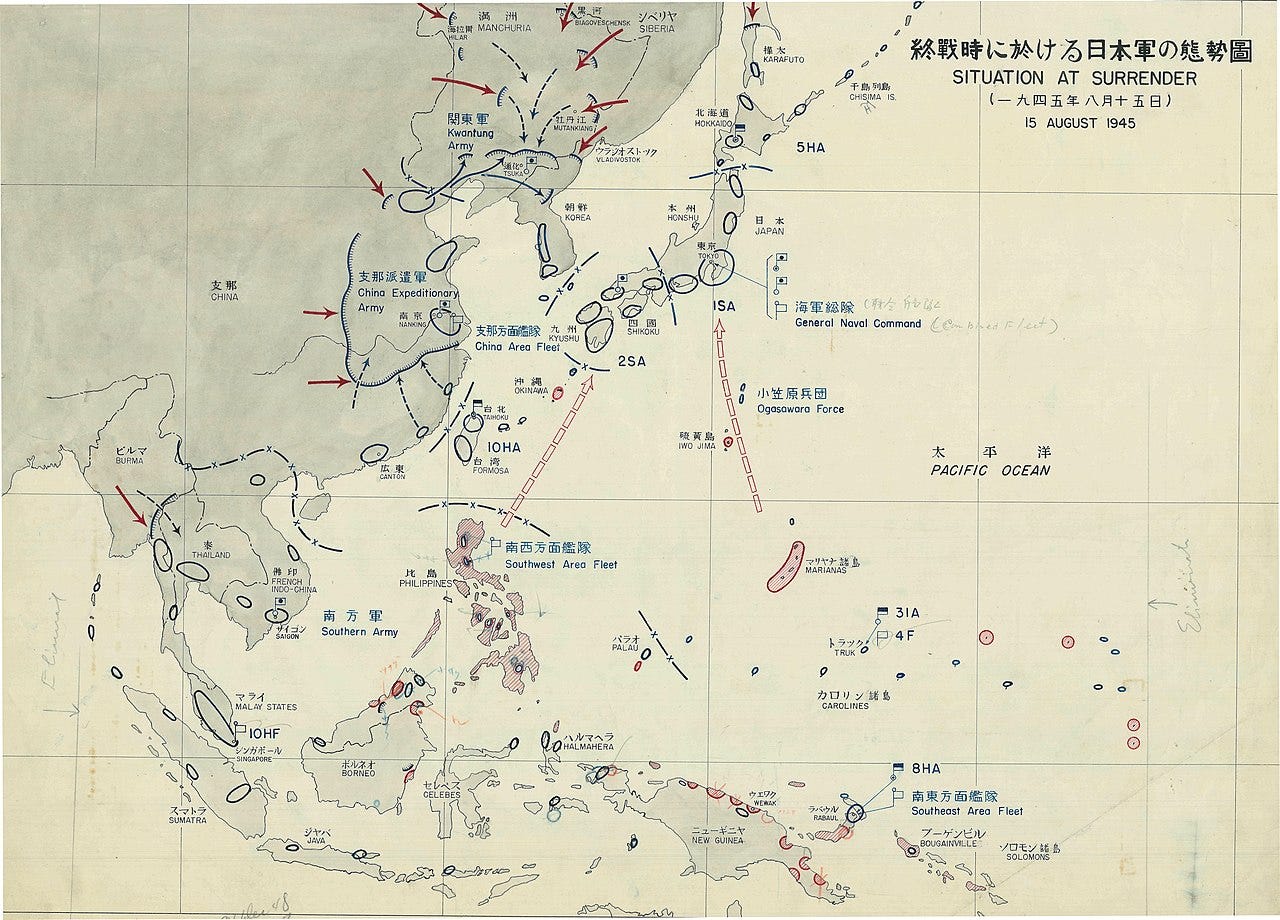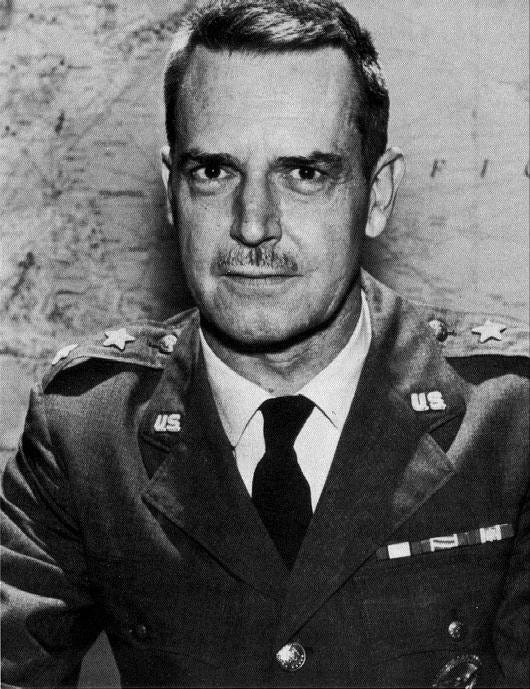Who Stole the Stolen Gold?
On the trail of Imperial Japanese plunder and an American coup, plus book picks
I’ve just returned from an amazing trip to Japan, which got me thinking (again) about an unsolved historical mystery involving the Empire of Japan and millions in allegedly stolen gold and riches.
During World War II, the Imperial Japanese conquered and subjugated Asia without mercy. They also plundered it. Some claim the Japanese military even enlisted yakuza gangsters to help move the vast stocks of treasure to occupied islands such as the Philippines.
The problem is, no one knows what happened to the plunder after the bloody and chaotic Pacific War ended.
Some point to US General Douglas MacArthur, who reigned as Supreme Commander of all Asia from his exalted HQ in Tokyo. The legendary MacArthur has been called either a brilliant maverick or a reactionary megalomaniac, though both are likely true.
From World War I to the Korean War, MacArthur held all the top ranks, won every high decoration, and is commonly idealized for winning the War in the Pacific—after nearly losing it early on. After the war, US ambassador to Japan William Sebald said about the controversial general: “Never before in the history of the United States had such enormous and absolute power been placed in the hands of a single individual.”
Whether reviled or exalted, the blue-blooded son of a general always kept a keen eye out for even higher glory and commissions. So it’s no wonder that MacArthur might’ve presided over a massive plunder heist in postwar Asia. And it was far from the first conspiracy with a MacArthur connection. One even involved ambitions to the US Presidency.
An American-Style Coup Finds its Man
Before the war, in 1933, the accusations came from a legendary American commander of a different stripe—then retired Marine Corps Major General Smedley Darlington Butler, who would soon write the antiwar classic War is a Racket.
A cabal of top businessmen, Butler warned, were scheming to overthrow President Franklin Delano Roosevelt and establish a fascist-style dictatorship of America. For their front man, they first wooed the maverick Marine general Butler himself. But Butler didn’t play along, since he sympathized more with everyday people and common soldiers. So Butler blew the lid off the plan.
The story first broke in the Philadelphia Record and New York Post. The Marine general even testified in Congress to the McCormack-Dickstein House Committee, which was investigating both Nazi and communist activities in the US at the time. The planned coup has become known as “The Business Plot,” as detailed by author Jules Archer in The Plot to Seize the White House.
Many don’t know about the MacArthur connection, however. During the hearings and news stories, hushed and sanitized though they were, it was revealed that the conspirators’ first choice for their fascist “Man on a White Horse” wasn’t Butler but none other than General Douglas MacArthur.
The coup faction aligned with renowned financier J.P. Morgan especially favored MacArthur. As then Chief of Staff of the United States Army, MacArthur had the pedigree and connections, yet the general would prove too extreme a choice even for fascist-leaning business interests. The year before, in 1932, MacArthur had led a brutal clampdown on the Bonus Army—the tens of thousands World War I veterans protesting with their wives and children in Washington, D.C. for the payment of bonuses long overdue. Now plagued by the Great Depression, many of them feared they would starve without the reward promised them by Congress. The great MacArthur did not sympathize, at all. He called in his troops and tanks and rode at the head of his charge, ordering his men to attack with fixed bayonets and sabers drawn and, if that was not brutal enough, had them deploy tear gas just as the enemy had done to those heroic vets in the Great War.
Appropriating Untold Plundered Treasure
Fast forward to World War II, when the Imperial Japanese allegedly moved those vast stocks of gold and riches to the Philippines and buried it in secret caverns and underground shelters. It’s referred to as “Yamashita’s Gold,” named after the top Japanese general defending the isles from General MacArthur’s storied return in 1945.
I’m no conspiracy theorist, but the clues persist. The clearest and strongest substantiation of the plundering comes from historians Sterling and Peggy Seagrave, who wrote two books asking many good questions: The Yamato Dynasty: The Secret History of Japan’s Imperial Family; and Gold Warriors: America’s Secret Recovery of Yamashita’s Gold.
The Seagraves and others allege that MacArthur inherited that secret mother lode of plundered fortune. Those connected to commandeering the plunder include notorious Japanese gangster Yoshio Kodama and controversial American intelligence operative Edward G. Lansdale, who some see as responsible for everything from America’s involvement in the Vietnam War to the Kennedy assassination. The Seagraves contend that MacArthur visited treasure sites in the Philippines after Lansdale reported them to the general—but not before Lansdale exerted ruthless interrogation methods to discover even more spoils.
The Seagraves also argue that the plundered Japanese treasure would outlive MacArthur by decades, its profits feeding one secret project after another. It went on to fund CIA missions, and black ops, the Nixon administration’s dirty tricks, and on and on.
Fact and Fiction in The Preserve
All this little-known background and speculation provide the starting point for my novel The Preserve. In 1948 Hawaii, Wendell Lett, a WWII veteran turned deserter, seeks a cure to his combat fatigue (PTSD) at a mysterious facility on the Big Island called the Preserve, but his handlers aim to turn him into a vile assassin for a deadly plot that runs all the way to—guess who—General MacArthur. The gambit was set. With the American generalissimo at peak strength and popularity, it was the perfect opportunity for certain powerful interests back home to co-opt the whole enterprise for a devious conspiracy.
While Wendell Lett and the Preserve are fictional, MacArthur, Lansdale and even Kodama appear in the story—MacArthur in a brief but decisive cameo, Lansdale in a main role highly fictionalized. As with Lansdale, many either love or hate MacArthur depending on allegiances. I simply find both characters too sensational not to loom large in my story.
Random book picks
Here are a couple novels I’ve read and enjoyed recently or in the distant past and in no particular order…
Reflecting on traveling as well as the early Cold War-era also got me thinking about Wanderer, a 1963 memoir by film noir actor Sterling Hayden, who I also love as Gen. Jack Ripper in Kubrick’s classic Dr. Strangelove. Whenever the world became too much for him, Hayden wandered the globe aboard various sea vessels he obtained at any and all cost. He had never felt comfortable in his skin as a hunky actor, and some of the best passages come when he comments on the fast-paced world of Hollywood and mid-century America in general. Another great section follows his exploits during WW2 as an OSS agent named John Hamilton running guns to Yugoslav partisans, a bold and heroic effort he surprisingly plays down—and I would like to know far more about. Tragically, he also sold out friends to the House Un-American Activities Committee, and later, defying a court order, absconded with his children on a sailing boat in one famously rash incident. But Hayden owns up to all his flaws and to the society that formed him. Some brief passages are downright poetic. For me, this beats On the Road for its criticism of 1950s America, a troubled cry from the dark side.
All this thinking about Asia reminded me of another great non-fiction read about a country that couldn’t be more different than modern Japan: North Korea. In The Cleanest Race (2010), B.R. Myers gives us an informative and well-written introduction to the North Korean mindset for anyone remotely interested in what is going on there. Imagine reading about a cult that’s a whole nation.
On sale through November 30: Lost Kin
You still have a couple more days to grab Lost Kin at $2.99 for the Kindle. It’s the previous book in the Kaspar Brothers series before Lines of Deception, coming in March.
And if you enjoyed reading Lost Kin, or any of my books, please consider leaving a review or rating at your favorite online bookstore. 😊








Fascinating. Think I'll have to meet your Wendell Lett character and follow his escapades. And I know so little about Gen. MacArthur. Thanks, Steve. Love the intrigue.
this is a really interesting story!